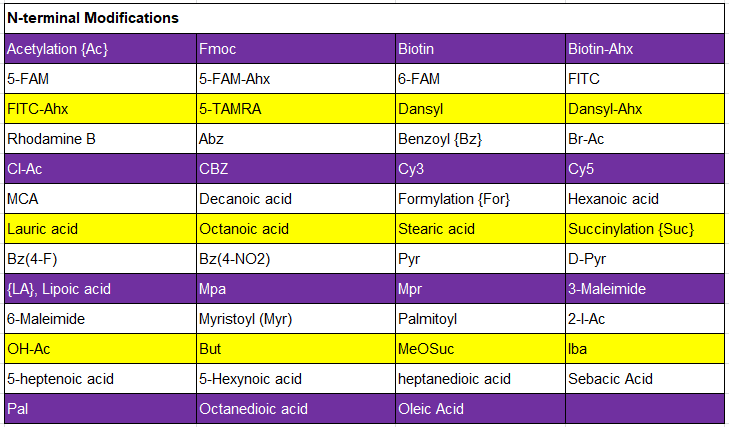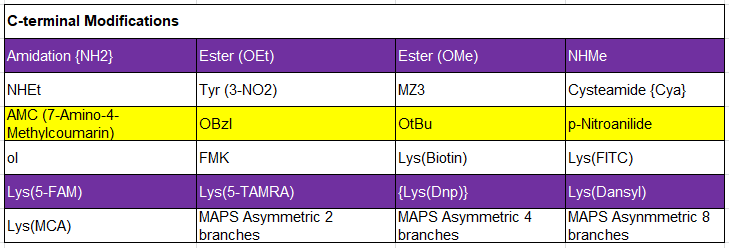N-terminal Modifications
Peptide N-terminal modification refers to the chemical alteration of the N terminus, or the start, of a peptide or protein. Proteins can undergo this process after they are formed to allow them to fulfill different biological functions.
N-terminal modification reduces overall solubility of the peptide by reducing its overall charges. However, the stability of the peptide could also be increased because N-terminal modification generates a closer mimic of the native protein. Therefore, these modifications might increase the biological activity of a peptide and prevent degradation by enzymes. The following are common peptide N-terminal modifications.
Below are examples of the N-terminal modifications that Tanda can provide:

C-terminal Modifications
Due to the properties C-terminal modifications can induce in proteins, they can be a very useful tool in both research and the therapeutic industry. Their convenience in nature has also been demonstrated in that most biologically active peptides have undergone post-translational modification. Membrane permeability, activity, stability and solubility are just some of the characteristics that can be adapted through C-terminal modifications. We use advanced technology and complex analytical tools to ensure the accuracy, repeatability and high yield of peptide modification.
Below are examples of the C-terminal modifications that Tanda can provide:

Phosphorylation
Protein phosphorylation is one of the most important post-translational modifications (PTMs) of proteins and is crucial for many biological processes such as cell signaling, gene expression and differentiation, regulation and control of DNA replication and mechanisms related to stress-induced replication blocks. Therefore, phosphorylation is essential for regulation of protein function and vital for the life of a cell.
Phosphorylation of a polypeptide refers to a form in which a Ser, Thr or Tyr side chain hydroxyl group in a peptide chain is converted to a phosphate by enzymatic or chemical methods. Phosphate is negatively electroned, when a polypeptide or protein is modified by a phosphate, its conformation will change greatly, affecting the interaction between the enzyme and the substrate. Many physiological processes mediated by peptides and proteins are achieved by the addition and removal of phosphate on the substrate.
The synthesis of site-specific phosphopeptides is crucial in order to understand and study phosphorylation events. The most common approach is the incorporation of protected phospho-amino acids into a specific or particular site of the sequence. There are another alternative approaches that can be applied, such as post assembly phosphorylation of serine, threonine or tyrosine containing peptide resins.
Over the years, Tanda has successfully made and delivered thousands of phosphopeptides.

Methylation
Peptide methylation is an important post-translational modification of proteins, usually occurring on arginine and lysine residues to form methylarginine and methyllysine, which inflences protein-protein interactions and gene expression. For the synthesis of methylated peptides several methyl groups can be transferred to arginine or lysine.
Tanda can provide all of the mono-, di- and tri-methylated Arg and Lys analogs listed:

Acetylation
N-terminal acetylation can remove the positive charge of the peptide and increase the stability of the peptide against enzymatic degradation at the end of the peptide chain. Acetylated peptides mimic internal peptide sequences better than peptides with free termini, which can be advantageous in cell studies or in vivo experiments.
Tanda can provide customers with peptide acetylation services according to different needs. Our common services include N-terminal Acetylation and Lysine Acetylation.
Sulfation
Tyrosine O-sulfation is a ubiquitous posttranslational protein modification. The revealed mechanism involves the enzyme tyrosylprotein sulfotransferase (TPST), which is responsible for transferring a sulfate group from PAPS (3′-phosphoadenosine-5′-phosphosulfate - NP46906 & NP46144) to a tyrosine residue. This PTM is known to occur regularly in proteins of multicellular eukaryotic organisms, whose total proteins are estimated of around 1% to be exposed to tyrosine sulfation. Several studies on tyrosine-sulfated proteins have demonstrated a major role for this PTM in enhancing protein-protein interactions, and its importance in numerous biological processes.
While tyrosine sulfated peptides are stable under basic conditions, the sulfate is unstable under acidic conditions. This makes the efficient synthesis of sulfated peptides technically challenging. Tanda has established reliable procedures for peptide sulfation which guarantee high success rates. Based on this, we can supply a wide range of tyrosine-sulfated peptides depending on sequence and specification.




